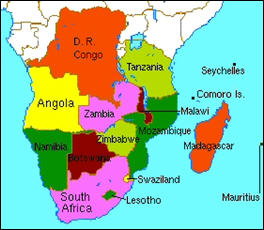
A new report by the Organization for Economic Cooperation and Development predicts Africa's economic growth will be cut in half this year and political tensions may soar as the continent struggles with the global economic downturn. But the Paris-based organization also says Africa is in better shape to deal with the crisis than a decade ago.
The report paints a bleak picture of the African economy in 2009. Hit by a drop in commodity prices, foreign investment and aid, the report says growth is expected to fall to 2.8 percent this year, less than half the 5.7-percent growth in 2008.
Growth is expected to pick up to 4.5 percent next year.
Four African countries, the Seychelles, Democratic Republic of Congo, Angola and Chad, are expected to see their growth rates decline. South African growth is also expected to drop to 1.1 percent, dragging down other economies in the region. The Central African Republic will be hardest affected by the crisis, with only 0.2 percent growth expected.
Overall, says OECD economist Federica Marzo, 2009 will be a tough year for everyone and Africa is no exception.
"However, one of the main conclusions of the African Africa Economic Output report of this year is that Africa seems to be much stronger and (more) well equipped to respond to the challenges of the crisis," Marzo said. "For different reasons, (including the fact that) the macro-economics fundamentals of the continent are stronger, in terms of ... the level of indebtedness. But also the continent has diversified not only its export products, but also the partners, trade partners - and here I am talking about the emerging economies such as China for instance."
Today, about 40 percent of African exports go to emerging markets, particularly Asian ones. Moreover, some countries may not do so badly this year. East Africa is expected to see growth rise by 5.5 percent.
"There are a certain number of countries that will grow at six percent or even more. And here I am talking about the most diversified countries, such as Tanzania for instance or the countries that rely on agriculture such as Burkina Faso, Malawi or Rwanda," said Marzo.
Still, he says the economic crisis should trigger an alarm in Africa because it came from outside the continent. One of the lessons for Africa, she says, is to invest more in domestic drivers of growth.
Related articles
- • UK Suspends Financial Aid to Rwanda Over M23 Rebellion (February 25, 2025)
- • UN Security Council Calls on Rwanda to Stop Supporting M23 Rebels in DR Congo (February 22, 2025)
- • Botswana Urges Joseph Kabila to Step Down (February 26, 2018)
- • DR Congo Scores High on Growth, Lags in Poverty Reduction: IMF (October 13, 2015)
- • Southern African Leaders to Meet in Zimbabwe (August 15, 2014)
- • New DR Congo amnesty law welcomed by UN envoys (February 5, 2014)
- • DR Congo, M23 Rebels Sign Declarations Marking End of Kampala Peace Talks (December 12, 2013)
- • DR Congo Will Defend Itself Against an Attack by Rwanda, Government Says (August 31, 2013)
- • UN Security Council debate focuses on peace efforts for Africa's Great Lakes region (July 25, 2013)
- • DR Congo Eases Process for Starting a New Business (June 3, 2013)
- • Warlord Bosco Ntaganda Turns Himself In at US Embassy in Rwanda (March 18, 2013)
- • Regional Leaders Sign DR Congo Peace Deal (February 24, 2013)
- • In Eastern DRC, Ex-Fighters Make a New Life With Coffee (November 5, 2012)
- • UN Security Council condemns 'any and all outside support' to M23 rebels (October 19, 2012)
- • At high-level meeting, Ban urges political solution to crisis in eastern DR Congo (September 27, 2012)
- • Kabila Names Finance Minister as New Prime Minister (April 19, 2012)
- • DR Congo Economic Growth Set to Reach An Unprecedented Seven Percent in 2013 (April 12, 2012)
- • DR Congo, IMF to Co-Host Conference on the Management of Natural Resources (March 13, 2012)
- • DR Congo's Government Resigns (March 6, 2012)
- • Observers Hail Successful DR Congo Elections (December 1, 2011)
- • 32 Million Congolese Voters Set to Elect Their Leaders (November 27, 2011)
- • UN advises prudent use of abundant resources to spur development (October 10, 2011)
- • DR Congo growth above 7 percent in 2010 - IMF (September 3, 2011)
- • President Jacob Zuma ends working visit to the DRC (June 21, 2011)
- • Hong Kong court decides to seek national legal interpretation over debt dispute between U.S. company, DR Congo (June 8, 2011)
- • China, DR Congo see great potentials for further cooperation (January 13, 2011)
- • DR Congo Decries Loss of Favored US Trade Status (December 22, 2010)
- • Paris Club cancels 7.35 billion of Congo debt (November 17, 2010)
- • SADC Summit to Discuss Zimbabwe's Political Progress (August 16, 2010)
- • IMF, World Bank Grant $12.3 Billion Debt Relief for DR Congo (July 1, 2010)
Tags: |







